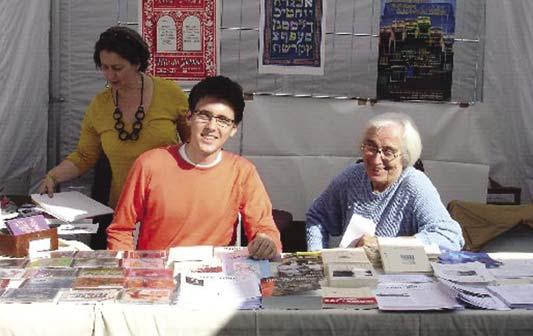
3 minute read
Growing Holocaust Teaching in China
Foreign educators and some 80 Chinese professors and graduate students have learnt about the Holocaust and, above all, how to teach it and get its message across for all peoples.
For one week in the sweltering heat of Kaifeng, known as the ancient capital and home of the renowned large Jewish community of China, a conference on the Holocaust was held, sponsored by the Task Force for international Cooperation on Holocaust Education, Remembrance and Research. Foreign educators and the Chinese representatives listened and exchanged ideas about all aspects of the Holocaust and what it meant for today’s world.
Advertisement
The Chinese participants represented a diversity of disciplines related to Jews or World War II, including Jewish history, the Bible, international relations and the Japanese occupation of Eastern China.
According to Dr Robert Rozett, Director of the Yad Vashem Libraries, who attended the conference, there were educators from the London Jewish Cultural centre, the Centre de Documentation Juive Contemporaine, Wannsee House, and the Holocaust Museum in Houston. Each brought his or her own perspective on the most important aspects of the topic
Wrong Guide Named
to educate members of the world’s largest populated nation, most of whom knew nothing about the Holocaust.
The Chinese wanted to know all about the Holocaust. One participant, Dr. Zhong Zhiqing, spent some time at the BenGurion University. She conversed knowledgeably in Hebrew and English about the most important fictional writing on the Holocaust and is translating Amos Oz’s works into Chinese. Other attendees are working on various Holocaust projects, including composing studies on anti-Semitism, a concept most Chinese find difficult to understand, although traces of anti-Semitism and Holocaust denial have risen in China due to the internet.
The Holocaust teachers and others are in the forefront of taking the Holocaust’s message and events to all Chinese and are a most significant bridge of understanding between the Jewish and Chinese people.
At an International Holocaust Educators’ Conference at Yad Vashem, in 2004, attended by our Executive Director, contact with Dr Zhang Qianhong, Professor of History and Director of The Institute of Jewish Studies, Henan University in China was established. This has enabled the personal exchange of ideas between the Holocaust Centre and Henan University.
In the last issue, due to a technical hitch, we inadvertently described volunteer guide Halina Zylberman as showing the editor of the Jewish News around the Centre when it was Lusia Haberfeld, a long time and highly-valued Centre volunteer guide.
Ulrich Kopetzki, who spent a year in France under the Austrian Gedenkdienst scheme, has written an article for Centre News on his experiences of Jewish life in France. Ulrich spent much time at the Melbourne Holocaust Centre during his Australian stay. Many renowned international organizations, including Yad Vashem and Anne Frank Centre, are included in the internationally-renowned Gedenkdienst scheme.
An Austrian Gedenkndienst student will spend a year at the Centre in 2008.
Ulrich Kopetzi writes about his life in France and the scheme.
Ever since Napoleonic times, there has been a strong Jewish community in France, which, during the years preceding World War II, recorded a substantial growth of members, as many European Jews hoped to find refuge from the Nazis in France.
In 1933, France generously opened its borders, hoping that most of the refugees would only stay for a short period of time. But soon, the French were hopelessly over-challenged with the large number of mostly Jewish immigrants who weren’t planning on travelling any further, but simply wanted to start a new life in France. As a consequence, government tightened the immigration rules and new immigrants had to overcome innumerous bureaucratic obstacles.
Nonetheless, even after 1933, thousands of Jewish immigrants arrived in France. When the Second World War began, about 300,000 Jews lived in the country. Only about two thirds of them survived the Holocaust. After 1945, again, about 80,000 Jews, many of whom came from Eastern Europe, settled in the country and thereby laid the foundation stone for a renaissance of Jewish culture in France.
One of the most important Jewish cultural organizations in contemporary France is “La Maison de la culture Yiddish – Bibliothèque Medem”. Formerly founded by Bundists, it is nowadays a non-partisan association that committed itself to promote the Jewish culture throughout France and Europe. It hosts one of the most extensive collections of Yiddish literature in Europe and offers a vast variety of cultural programs. Yiddish







